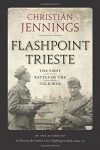From time to time, history books present a stumbling block for readers. Some written by historians, particularly academics, read like they were — well — written by a historian. It’s not just writing style. There’s also that pattern of an opening chapter or introduction telling us what each subsequent chapter talks about, with each subsequent chapter opening with an overview of the chapter and closing with a summary of it.
That certainly isn’t the case with Christian Jennings’s Flashpoint Trieste: The First Battle of the Cold War. It reflects the beauty of concise, expositional writing. As a foreign correspondent, Jennings writes more like a journalist. This enables him to give the book a pace often lacking in more academic books. At the same time, though, he too often uses sentence fragments such as, for example,”Which had included what was now Yugoslavia.”
 Flashpoint Trieste tells a story of World War II and its aftermath not widely known. The city, located on the Adriatic, was annexed to Italy after World War I but Yugoslavians believed it should be part of their country. As World War II came to a close, British and American leaders feared that Tito being a communist could mean Trieste could end up essentially controlled by Stalin. This led to what was essentially a race to be the first to take the city as the war came to a close.
Flashpoint Trieste tells a story of World War II and its aftermath not widely known. The city, located on the Adriatic, was annexed to Italy after World War I but Yugoslavians believed it should be part of their country. As World War II came to a close, British and American leaders feared that Tito being a communist could mean Trieste could end up essentially controlled by Stalin. This led to what was essentially a race to be the first to take the city as the war came to a close.
Ultimately, this meant the city was a geopolitical focus of the U.S., Great Britain, Italy, Yugoslavia and the Soviet Union. Flashpoint Trieste examines not only the interests and actions of each but also the history of the region, the ethnic tensions and bloody reprisal, and the melange of intelligence forces and operations.
While interesting, the book suffers from the antithesis of the problems that can arise in academia. While very readable, it seems to lack the rigor, continuity and depth of historical method. Jennings certainly shouldn’t be condemned for not being a professional historian. Yet in a genre with authors like Candice Millard, Ron Chernow and Hampton Sides, for example, Flashpoint Trieste requires more.
The actual status of Trieste can be determined at leisure. Possession is nine points of the law.
Winston Churchill to Harry Truman, quoted in
Christian Jennings, Flashpoint Trieste







